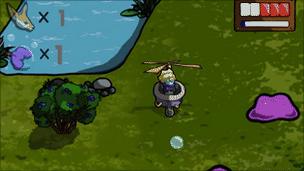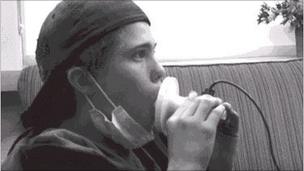Will computer games help children with cystic fibrosis?
- Published

A spirometer is used to blow slime off animals in the computer game Creep Frontier
Could computer games be the solution for persuading children with cystic fibrosis to complete their physiotherapy?
The genetic condition leads to the build-up of thick mucus in the lungs.
Physiotherapy, including breathing exercises, is used to clear the lungs and open up the airways.
Carys, aged 12, from Glasgow, has two sessions a day, - but as her mother, Michelle McMonagle, says: "There is a conflict between what she wants to do and what she knows she has to do."
For Carys, computer games, drawing, music, drama and movies are all more appealing.
"There's other things she wants to do. It's like washing dishes or any chore, you'd rather be doing anything else," says Ms McMonagle.
Skipping physio
Doctors in the US have noticed children rarely perform their breathing exercises, preferring to do other things, such as playing computer games - so they combined the two.
Instead of using a hand-held controller or motion sensor, these games rely on a spirometer, which measures how much and how fast air is exhaled.
Breathing is used to drive a car in one racing game and to blow slime off animals in another.
Professor Peter Bingham, from the University of Vermont and Fletcher Allen Health Care, tried the games out on 13 children with cystic fibrosis (CF), aged between eight and 18.

Breathing controls the on-screen action
He said: "The key finding was that children actually use them.
"Spirometer games can be a good way to involve children in respiratory therapy.
"It's ethical and appropriate to meet kids where they are with some engaging, digital games that can help them take charge of their own health."
Professor Peter Bingham now wants to do a larger clinical trial on the games' effectiveness.
Ms McMonagle said: "I know lots of parents who already use trampolines to encourage exercise; anything that makes physio more attractive is going to help."
The condition affects more than 8,500 children and young adults in the UK.
Gemma Matthews, from the Cystic Fibrosis Trust, said: "Children with CF have a heavy daily burden of treatment every day, which they often find tiresome.
"Clinicians and parents are constantly thinking of new ways to encourage children to do their treatment and engaging them through video games is a great way to make treatment less of a chore."